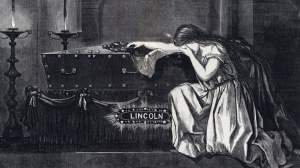Record Data
Source citation
"The Murder of President Lincoln," New York Times, April 16, 1865; p. 4.
Type
Newspaper
Date Certainty
Exact
Transcriber
John Osborne, Dickinson College
Transcription date
Transcription
The following text is presented here in complete form, as it originally appeared in print. Spelling and typographical errors have been preserved as in the original.
THE MURDER OF PRESIDENT LINCOLN
The heart of this nation was stirred yesterday as it has never been stirred before. The news of the assassination of ABRAHAM LINCOLN carried with it a sensation of horror and of agony which no other event in our history has ever excited. In this city the demoinstrations of grief and consternation were without parallel. Business was suspended. Crowds of people thronged the streets - great gatherings sprung up spontaneously everywhere seeking to give expression, by speeches, resolutions, &c., &c. to the universal sense of dismay and indignation which pervaded the public mind.
Perhaps the paramount element in this public feeling was evoked by personal regard for ABRAHAM LINCOLN. That a man so gentle, so kind, so free from every particle of malice or unkindness, every act of whose life has been marked by benevolence and goodwill, should become the victim of a cold-blooded assassination, shocked the public heart beyond expression. That the very moment, too, when he was closing the rebellion which had drenched our land in blood and tears - by acts of magnanimity so signal as even to excite the reluctant distrust and apprehensions of his own friends - should be chosen for his murder, adds a new element of horror to the dreadful tragedy.
But a powerful element of the general feeling which the news aroused was a profound concern for the public welfare. The whole nation had come to lean on ABRAHAM LINCOLN in this dread crisis of its fate with a degree of confidence never accorded to any President since GEORGE WASHINGTON. His love of country ardent and all-pervading, - swaying every act and prompting every word, - his unsuspected uprightness and personal integrity, - his plain, simple common sense, conspicuous in everything he did or said, commending itself irresistibly to the judgment and approval of the great body of the people, had won for him a solid and immovable hold upon the regard and confidence even of his political opponents. The whole people mourn his death with profound and sincere appreciation of his character and his worth.
ANDREW JOHNSON, of Tennessee, is now the President of the United States. We have no doubts and no misgivings in regard to the manner in which he will discharge the duties which devolve so suddenly upon him. This country has no more patriotic citizen than he - no one among all her public men who will bring to her service a higher sense of his responsibilities, a sounder judgment in regard to her interests, or a firmer purpose in the maintenance of her honor and the promotion of her welfare. He has suffered, in his person, his property and his family relations, terribly from the wicked rebellion which has desolated the land; but he is not a man to allow a sense of personal wrong to sway his judgment of control his action in a great national emergency. Traitors and rebels have nothing to expect at his hands, but strict justice, tempered with such mercy only as the welfare of the nation may require.
In this hour of mourning and of gloom, while the shadow of an awful and unparalleled calamity hangs over the land, it is well to remember that the stability of our government and the welfare of our country do not depend upon the life of any individual, and that the great current of affairs is not to be changed or checked by the loss of any man however high or however honored. In nations where all power is vested in single hands, an assassin's knife may overthrow governments and wrap the continent in the flames of war. But here the PEOPLE rule, and events inevitably follow the course which they prescribe. ABRAHAM LINCOLN has been their agent and instrument for the four years past; ANDREW JOHNSTON is to be their agent and instrument for the four years that are now to come. If the people have faith, courage, and wisdom, the result will be the same.



